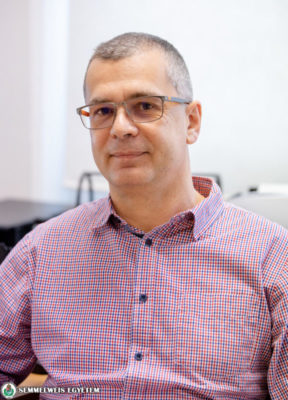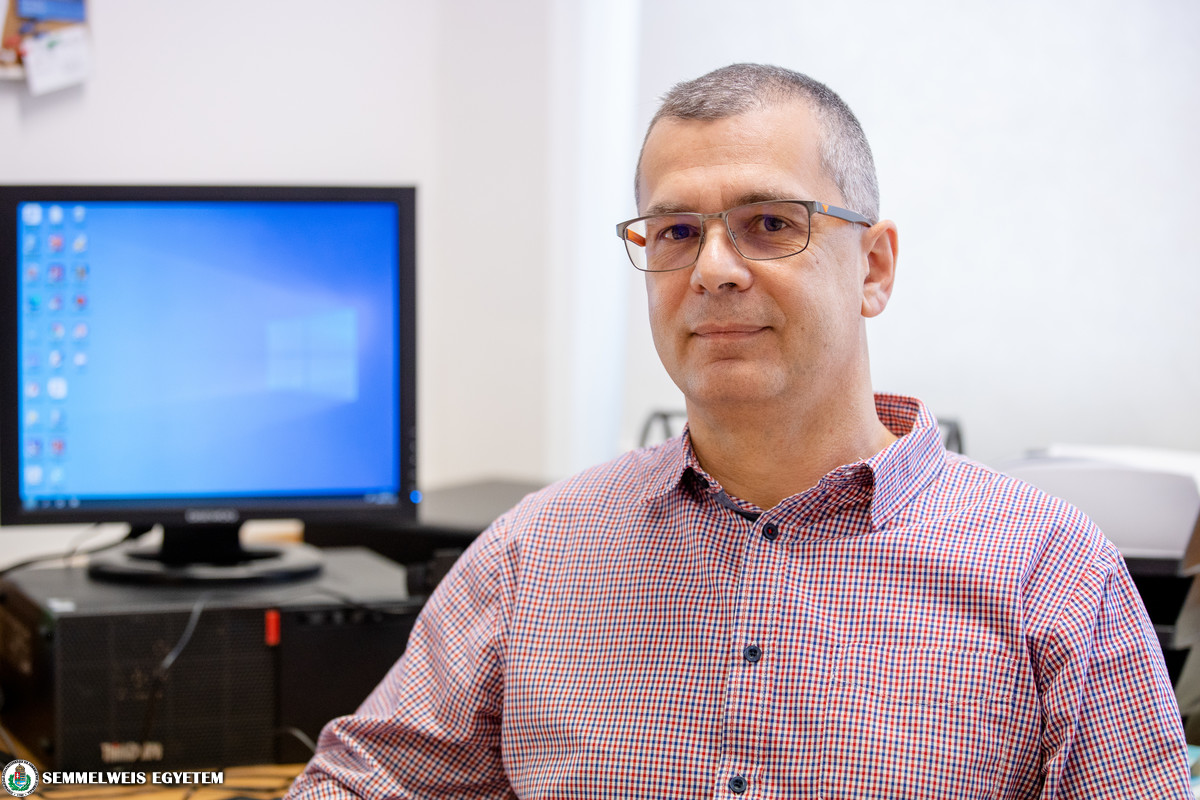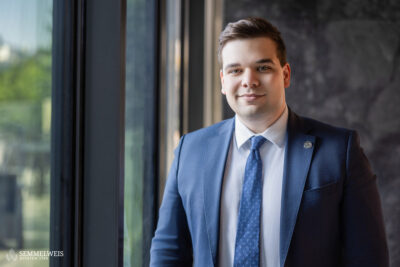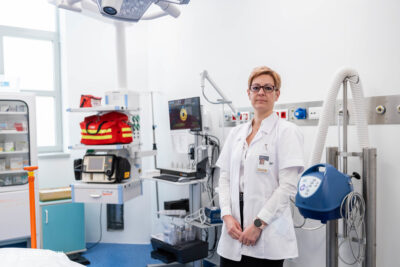“One has to put great emphasis on the preservation of teeth.”, said Dr. János Vág, who was appointed as the new head of the Department of Conservative Dentistry in December. It is among his plans to establish a special emergency patient care room at the department, where patients would be provided with the most modern treatment services. Propedeutics is one of the key courses in dental education, therefore he plans to expand to a three-semester course in the future. Dr. János Vág considers it very important to establish a modern patient management system in clinical education that selects the patients and classifies them into groups. With the introduction of such a system, every student would be able to take care of a case with a difficulty level corresponding to their proficiency level. Dr. Vág also highlighted the development of digital dentistry, as well as the importance of maintaining a family-friendly attitude at the workplace.
 Dr. János Vág was first working at the Department of Physiology, and later, he started working at the Department of Conservative Dentistry, and turned his attention to the physiology of oral cavity circulation thanks to the influence of Dr. Árpád Fazekas, head of the department at the time. After his specialist exam, he studied molecular and cell biology in Dublin, Ireland, related mainly to salivary glands and he continued his research upon his return to Hungary. In close cooperation with the Department of Periodontology, he was doing research on the circulation of periodontal lobes and the healing of surgical wounds, and he also examined different molecular markers. After spending some years in the private sector, he returned to the department at the beginning of 2013, where he had deputy director responsibilities starting from 2015.
Dr. János Vág was first working at the Department of Physiology, and later, he started working at the Department of Conservative Dentistry, and turned his attention to the physiology of oral cavity circulation thanks to the influence of Dr. Árpád Fazekas, head of the department at the time. After his specialist exam, he studied molecular and cell biology in Dublin, Ireland, related mainly to salivary glands and he continued his research upon his return to Hungary. In close cooperation with the Department of Periodontology, he was doing research on the circulation of periodontal lobes and the healing of surgical wounds, and he also examined different molecular markers. After spending some years in the private sector, he returned to the department at the beginning of 2013, where he had deputy director responsibilities starting from 2015.
Conservative dentistry deals with the preparation of dental fillings and the restoration of tissue damage caused by tooth decay. One of its extremely dynamically developing branches is endodontics, which focuses on the diseases of the dental pulp as well as the treatment of teeth with unsuccessful root canal treatment. These two treatments make up 80% of everyday dentistry, and if they are both accomplished properly, dental implants can be avoided.
Dr. János Vág also took part in laying the foundations for the endodontic specialist training at the department introduced two years ago.
“Root canal treatments can become very complicated in 50% of the cases, and graduate training does not provide enough space and time for the treatment and teaching of such difficult cases. This is the reason why we introduced our specialist training with a duration of 3 years focusing on this area. Nowadays there are materials available which enable the regeneration of the dental pulp, thus root canal treatment can be avoided. This is a new area of endodontics.”, said Dr. Vág.
At the Department of Conservative Dentistry as an educational institution, dental patient care is provided by students in the framework of clinical practices, supervised by dentists. The department is usually very busy: currently graduate training is carried out in 30 dentists’ chairs, and about 100 patients are treated by students on a daily basis. Almost half of the staff are resident doctors and the department’s emergency care is one of the busiest at the Faculty of Dentistry.
According to Dr. Vág, one of the most difficult tasks are diagnosis, prognosis and decision making on the case’s difficulty level, which requires professional experience of several years. In order to facilitate this, it is among his plans to establish a modern patient management system in clinical education that selects the patients and classifies them into groups with great precision. With the introduction of such system, every student would be able to take care of a case with a difficulty level corresponding to their educational proficiency level. It also requires the establishment of an appropriate computer infrastructure.
 Dr. János Vág highlighted propedeutics as one of the key preclinical subjects in dental education.
Dr. János Vág highlighted propedeutics as one of the key preclinical subjects in dental education.
“It is a key subject, since this is when students start preparing for the practical sessions of clinical dental activities requiring high precision and heightened manual skills. With the help of simulation, dental students have the opportunity to practice the most important clinical steps of conservative dentistry, which they will apply during clinical practice later on. Therefore, the expansion of the duration of propedeutic training from two to three semesters is among my long-term plans. The institution’s gradual transition to digital dentistry is also a priority, as it is important that dental students learn digital sampling. “, said Dr. János Vág.
Regarding the currently running research projects of the institution, he highlighted two: one of them is related to gum circulation studying wound healing of surgical lobes in cooperation with the Department of Periodontology. In case of patients with diabetes, wound healing is a lot more difficult in the oral cavity, which is one of the subjects of the research, but cardiovascular diseases also have and effect on gum circulation.
“The other main research focus is digital dentistry: one of its branches is called the new generation dental identification protocol, which won the Innovation Award in the category of the most innovative clinical research work last year. The new generation dental identification protocol involves an intra-oral scan that creates a digital image of the mouth pattern, which may be used for human identification due to its unique characteristics. At the department, there are ongoning research projects on the microbiological implications of root canal treatments, where the new approach related to the regeneration of the dental pulp instead of root canal treatment is becoming more and more prominent.”, explained Dr. Vág.
In accordance with Semmelweis University’s Family Friendly Program, Dr. János Vág considers it important to support the harmonization of career and family, therefore he aims to provide the department’s residents, PhD students and colleagues with all the help possible before their specialist exams so that they do not have to make a choice between career and family.
Bernadett Bódi
Photo: Attila Kovács – Semmelweis University
Translation: Katalin Illés-Romhányi


